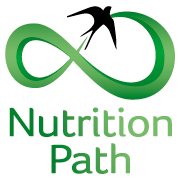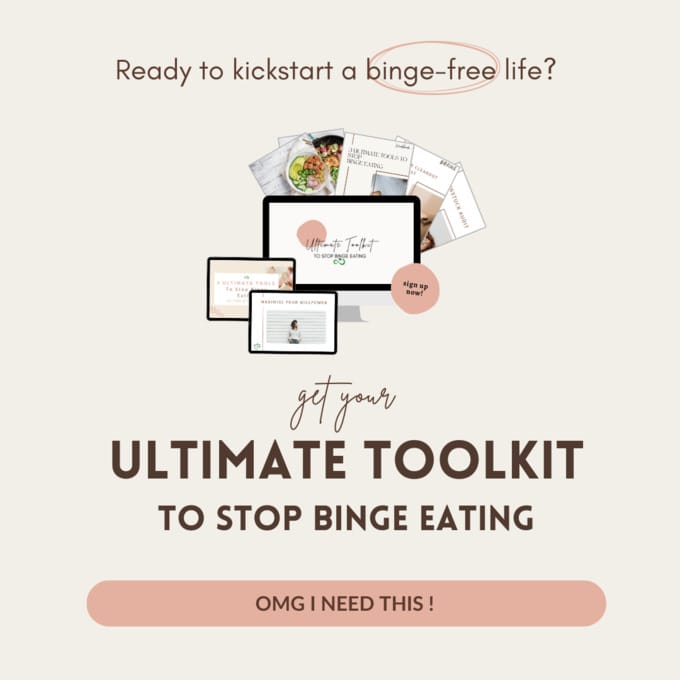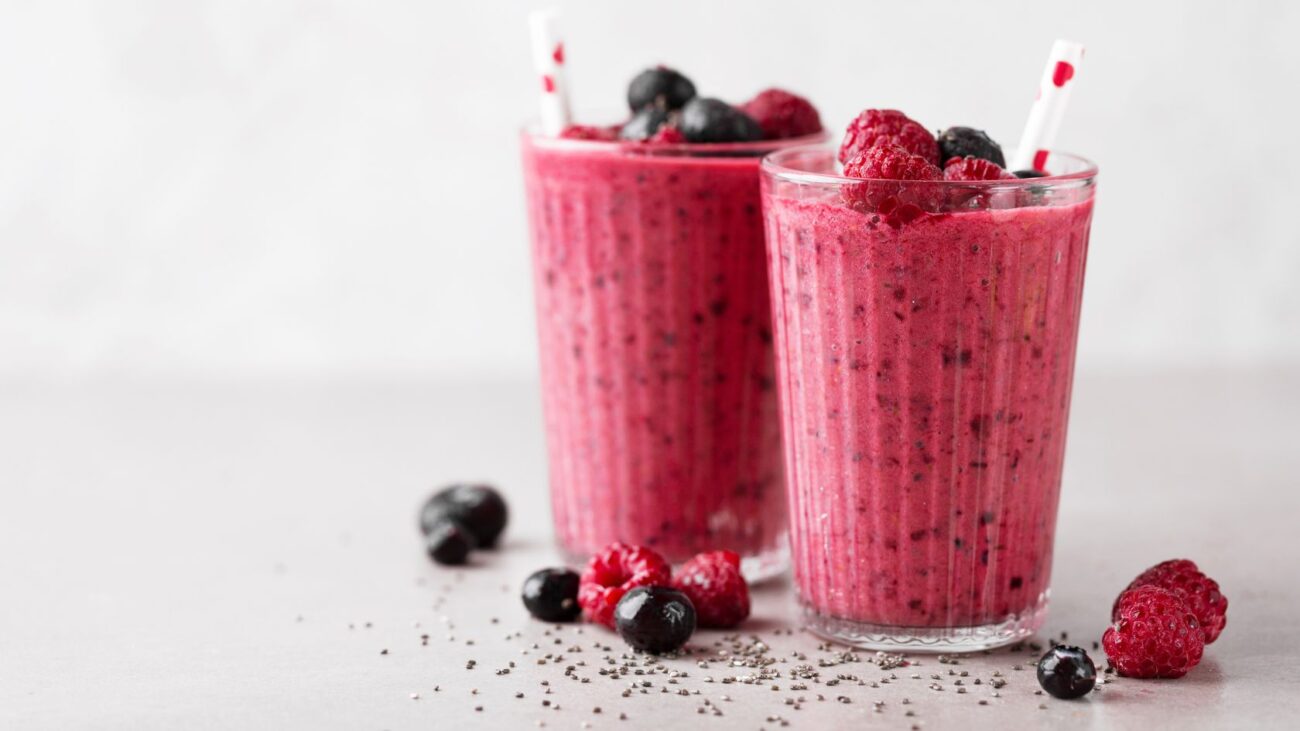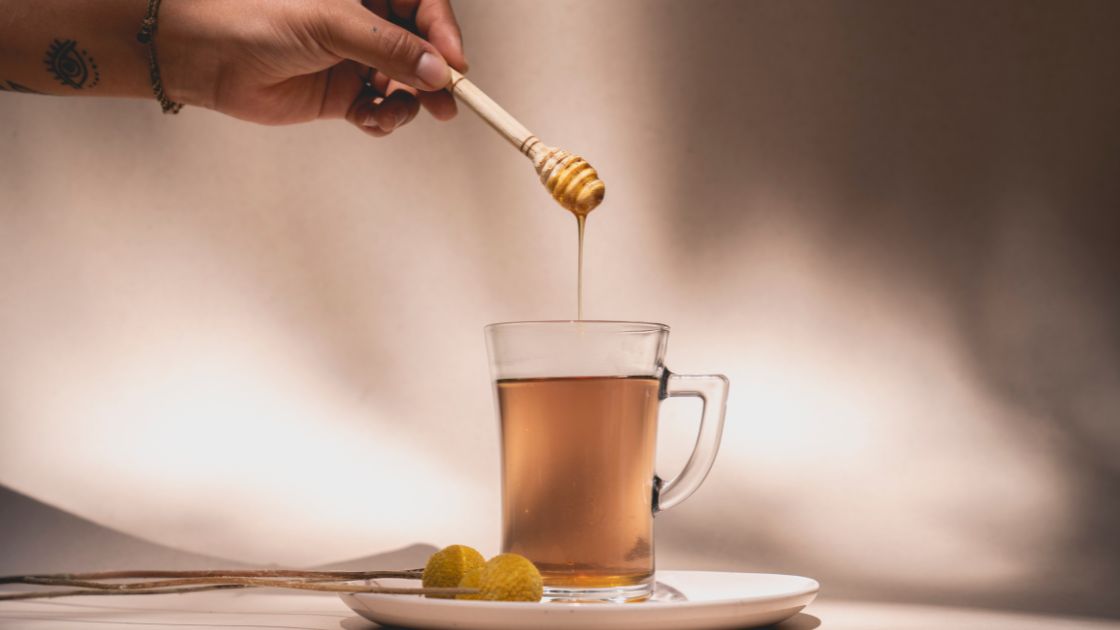Are you constantly battling sugar cravings? Despite your best efforts, do you find it difficult to resist those office staffroom biscuits? The ancient peoples may have figured out a thing or two about keeping the body balanced and stable. Now we can use that knowledge to cut excess sugar consumption too.
When sugar cravings hit it can feel like it’s sabotage your efforts towards your health goals or a healthy relationship with food. Processed and ultra-processed foods have become a culprit of many people’s diets, especially in the Western world. Refined sugars are hiding in cornerstone foods like yoghurt and hummus (yes!), increasing the intake of hidden sugars without us even noticing. Ancient civilizations used herbs and spices for centuries to nourish the body and curb sweet cravings and there’s a thing or two we can learn to support our health too.
Instead of relying on willpower alone, try adding these ancient herbs into your daily routine to provide a natural and effective way to stop sugar cravings. Let’s explore the best ancient herbs for sugar cravings and achieving your wellness goals.
The Statistics on Sugar Consumption
These scary statistics highlight the widespread use of sugar across the globe. Sweet, delicious and widely available sugar affects not only the taste buds but also our health. Excessive sugar consumption has been linked to obesity, diabetes, and cardiovascular diseases, not to mention our mental balance.
- An average American consumes 17 teaspoons (71.14 grams) of sugar daily, which is 2-3 times more than the recommended amount. This adds up to 60 pounds worth of added sugars per year. Or the equivalent of 6x 10-pound bowling balls (yikes).
- An average person in the UK consumes around 94g of sugar daily. Additionally, 10-15% of energy comes from sugar, rather than the recommended 5%
- In 2023 global sugar consumption is estimated to be 176 million metric tons. It is projected to increase to about 180.05 million metric tons by 2024. Sugar has never been so widely available and so cheap as it is today.
Best spices and herbs for sugar cravings
There is no proven solution to completely stop sugar cravings without making any changes to your diet and lifestyle first. This typically involves supporting blood sugar control through a series of tweaks in diet and switching up drink choices. Also, adding some gentle exercise and managing stress well is also key.
However, you may be well ahead if you’re already trying to make better food choices. This is where adding a few ancient herbs and spices can help you improve insulin sensitivity, help you avoid insulin spikes and help you set up an even more balanced diet.
Sounds too good to be true?
Let’s dive in and explore some of my favourite spices and herbs to stop sugar cravings from all around the world. Great news that the knowledge of the centuries is available in your kitchen pantry, right now.
1. Cinnamon
First on the list of favourites is cinnamon. Also known as Cinnamomum, this spice has been used for thousands of years, dating back as far as Ancient Egypt.
There are two types of cinnamon widely available. Ceylon cinnamon is known as the ‘true’ or ‘original’ type of cinnamon. And the more common variety is called Cassia. The two can be used interchangeably for culinary purposes. However, aim to get Ceylon cinnamon when possible as it is higher in quality and less produced on a mass scale.
You may already love cinnamon due to its approachable, sweet taste, but did you know that it’s also packed with health benefits?
One study of 140 participants showed that 1mg of cinnamon (1/3 of a teaspoon) for 3 months showed significant improvements in insulin resistance and glucose tolerance in people with diabetes type 2.
Moreover, It’s packed with antioxidants and polyphenols. This means that cinnamon also has anti-inflammatory properties and may help reduce oxidative stress in the body and support healthy ageing.
And that’s not all. Cinnamon has a naturally sweet taste and is an excellent spice to add to your morning porridge or chia overnight oats. Add to your morning latte (preferably matcha) for more stable management of caffeine.
Many of my Nutritional Therapy practice clients love simply drinking a strong cinnamon tea in the afternoon to manage the “afternoon slump”.
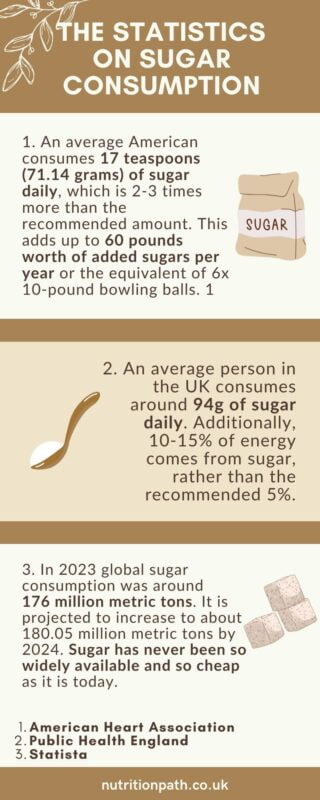
2. Coriander (or Cilantro) seeds
Depending on where you go, you may find this herb under two names- coriander and cilantro. Often used interchangeably, coriander in fact is the seed of the cilantro plant. It is known as Coriandrum sativum.
A favourite in Indian curries, coriander seeds are part of Ayurvedic Medicine. It may serve the purpose of decreasing belly bloating, that arises from a diet high in beans and legumes. In modern herbalism, coriander seeds are widely used for IBS symptoms, bloating, flatulence and digestive discomfort.
Coriander seeds have shown significant action in stimulating insulin and increased blood sugar regulation. This means more stable energy and fewer sugar crashes.
If you also struggle with lowering your cholesterol levels, coriander could be useful. Animal research points towards its potential to lower LDL and increase HDL cholesterol levels.
A favourite in a curry of your choice, coriander seeds are also a great addition to meat dishes, vegetable stews, lentils and simply fresh vegetables. A good idea is to mix it into your pepper mill to effortlessly keep adding coriander to your daily life.
3. Ginseng
Widely used all over the world, ginseng originates in Asia. There a few different varieties, such as Siberian, Panax or Korean ginseng.
Ginseng is an adaptogenic herb. It means it belongs to a family of herbs and plants that may help you improve stress response by adapting to your current state. They are neither stimulants nor sedatives. Therefore they are excellent for giving you exactly what is needed in the moment.
You may have heard before that ginseng is helpful for memory and focus, but that certainly is not all. One study of 61 participants showed that ginseng extract improved short-term memory, focus and relieved mental fatigue only after 2 weeks of supplementation.
Ginseng has been found to be effective in managing insulin resistance and stabilizing blood sugar levels. Therefore, it’s one of the few really effective herbs for sugar cravings. It helps eliminate energy slumps and blood sugar spikes throughout the day.
Ginseng certainly isn’t the tastiest of herbs and the easiest way to make sure you get some in your diet is by brewing a ginseng tea. You may often see it as part of a mix of green or herbal tea.
If you feel that the benefits of ginseng will outweigh the taste, sneak some into your smoothie or juice.
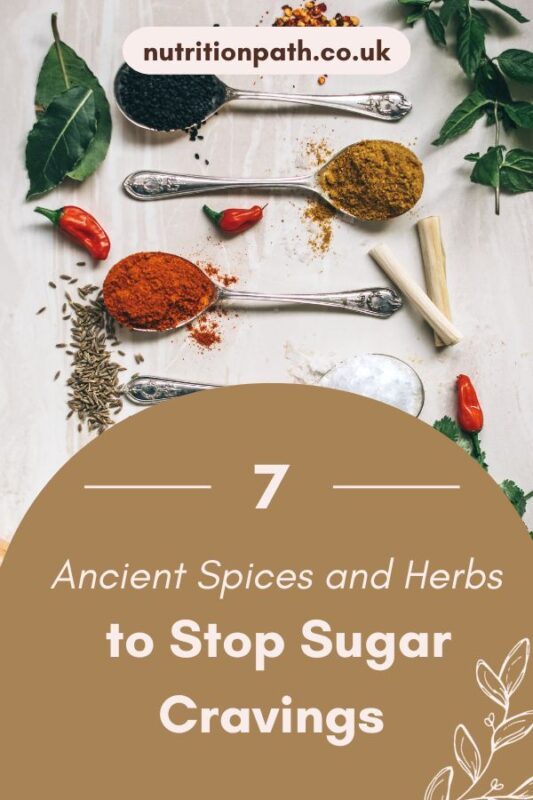
4. Turmeric
With the popularity of turmeric over the past 10 years, it really is a spice of the season. Once again a favourite of Ayurvedic medicine, it is also called a golden spice for its bright orange colour.
Curcumin, the active constituent of turmeric has been used for a myriad of benefits. This includes liver support (including alcohol and sugar detox), anti-inflammatory properties and impact on lowering blood sugar levels.
In fact, curcumin has shown success in lowering blood glucose levels in 453 study participants with type 2 diabetes.
Add turmeric to curries, soups and sauces and remember to add black pepper alongside for better absorption.
5. Gymnema
Gymnema Sylvestre one of the fascinating herbs for sugar cravings that I have discovered only while studying nutrition. This herb has been used in Ayurvedic medicine but is also found in Africa.
It is suggested that the gymnemic acids present in the plant attach to sugar receptors and alter sweet flavour or sugary foods. In turn, the sweet foods become less pleasant and sugar intake is successfully reduced.
One study of 61 participants showed that Gymnema supplements reduced the pleasant taste of sweet foods, such as chocolate in just two weeks.
Another study of 56 healthy participants showed that Gymnema reduced chocolate carvings by 21%.
As gymnema is not particularly palatable, it is often consumed in the form of a supplement.
6. Fenugreek
Ever wonder why so many of the spicy dishes often have a soothing, calming effect on the body? And creates a long-lasting feeling of satiety and comfort?
An old-time favourite in a number of cuisines all over the world, fenugreek is widely used in curries, mid-eastern dishes and kitchens in other parts of Asia. Also called methi dana in Hindi.
Ayurvedic and Chinese Traditional Medicine practitioners use it for a variety of discomforts and ailments. From diabetes and metabolic imbalances to cooling inflammation in the whole body.
Another one of the amazing herbs to stop sugar cravings to add to your diet for long-term balance. Fenugreek may be effective in significantly improving blood sugar balance. Traditionally, it is soaked in hot water, kept overnight and only then consumed. It’s also delicious on a curry or a stew.
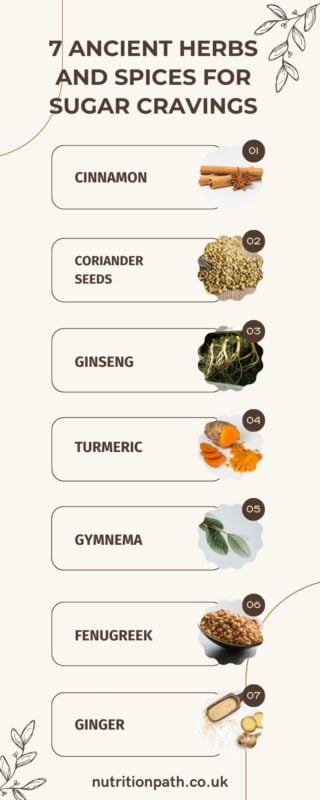
7. Ginger
Ginger has become a favourite in kitchens all over the world through the centuries. Health practitioners from Ayurvedic, Chinese Medicine to Western Medicine traditions all recognise its health benefits.
Ginger root is packed with health benefits and due to its anti-inflammatory nature, is used to improve bone and joint health, reduce morning or motion sickness, relieve bloating and even ease period pains. Certainly, a pretty handy and amazing spice to have in your cupboard.
For those experiencing sugar cravings, you may want to include more ginger in your diet as it has been shown effective in balancing hormone insulin levels in a systematic review of 10 clinical studies.
Surely you’re familiar with turning to ginger in the flu season and its delicious spicy healing tea can truly get you back in action in a few days. Ginger gives a nice spicy kick to foods, whether it’s a Thai soup or a stir fry.
If you drink your morning water with lemon juice, try switching it up with ginger instead and see what your body prefers the most.
A word of caution using spices and herbs for sugar cravings
If you’re struggling with overwhelming sugar cravings, it can be tempting to use all the spices and herbs for sugar cravings all the time. And perhaps even take supplements of the same herbs.
However, it is crucial to remember that even the most gentle and common herbs can have an influence on our wellness. If you are taking any medication, it is crucial to discuss the use of even culinary spices and herbs to stop sugar cravings with your doctor or pharmacists before starting.
This is because some medications have interactions with a herb or spice and may affect how medications are metabolised in the body. So make sure that you consult a registered health professional before starting any spices or herbs to stop sugar cravings.
How to use spices and herbs to stop sugar cravings
Options for herbs and spices are endless, whichever cuisine you turn to. These seven of my favourite spices and herbs for sugar cravings are only the tip of the iceberg. But when it comes to healing herbs, each one is packed with endless benefits, that even science is yet to discover fully.
It’s all good and well to know about the magic, that herbs and spices can bring to your life, but it’s equally as important to take the knowledge back into the kitchen and make it work for you in practice.
Hope this inspires you to add a little spice back into your own cooking. Get experimenting and create habits that make your body and mind feel better, effortlessly. I find that healthy food only ‘works’ when it is delicious.
What are your favourite ways to use these herbs and spices? Let me know in the comments below. 👇👇👇
FAQ about herbs and spices to stop sugar cravings
- How can herbs and spices reduce sugar cravings?
Some herbs and spices can help balance blood sugar levels, increase satiety and food satisfaction, therefore reducing sugar cravings. These include cinnamon, coriander or cilantro seeds, turmeric and gymnema. - What are the best herbs and spices to reduce sugar cravings?
Cinnamon, gymnema, turmeric, ginger, coriander (or cilantro) seeds and fenugreek and just a few herbs and spices and help balance blood sugar and reduce sugar cravings. - How can I add herbs and spices to help reduce sugar cravings?
Add cinnamon to your morning porridge or yoghurt. Add ginger, turmeric or coriander (cilantro) seeds to a curry, vegetable stew or soup. Make a tea with ginseng, ginger, turmeric or cinnamon. - Can I use herbs and spices to reduce overall sugar intake in recipes?
Absolutely! More cinnamon in baked treats can replace some sugar or sweeteners, while turmeric, ginger and coriander (cilantro) seeds can add extra spiciness to the dish. - How long does it take to reduce sugar cravings while using herbs and spices?
It takes time to balance blood sugar levels. While it’s important to also eat regular balanced meals, adding herbs and spices can help the process. It may take a few weeks of consistent action to start to see a reduction in your sugar cravings.
Sources cited:
https://www.heart.org/en/healthy-living/healthy-eating/eat-smart/sugar/how-much-sugar-is-too-much
https://www.gov.uk/government/publications/sugar-reduction-from-evidence-into-action
https://www.statista.com/statistics/249681/total-consumption-of-sugar-worldwide
https://pubmed.ncbi.nlm.nih.gov/29605574
https://pubmed.ncbi.nlm.nih.gov/37432178
https://www.jeb.co.in/journal_issues/200801_jan08/paper_08.pdf
https://pubmed.ncbi.nlm.nih.gov/34396468
https://pubmed.ncbi.nlm.nih.gov/35509826
https://pubmed.ncbi.nlm.nih.gov/34484389
https://pubmed.ncbi.nlm.nih.gov/36558446
